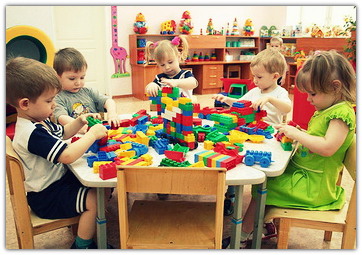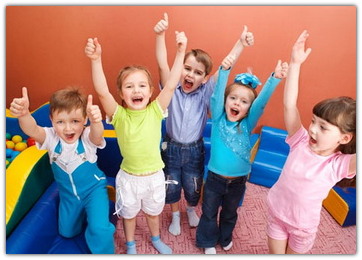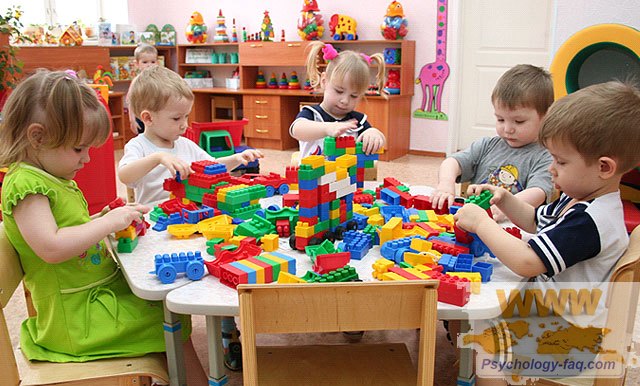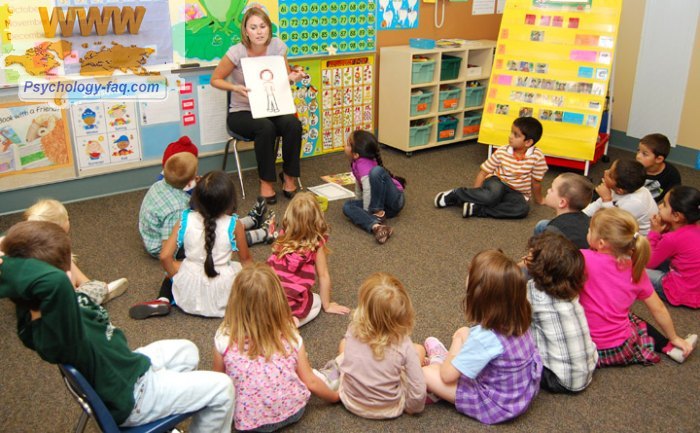Kindergarten is evil. Or at least a place that the child is better off avoiding. This opinion has been incredibly popular lately, and it has substantial justifications, and in many respects it is fair. But remember: when deciding between a kindergarten and purely home education, you need to think not only about immediate prospects, but also about long-term consequences.
Do not go, children, to kindergarten
The main danger is, of course, educators. Please understand correctly: not all of them are as such. Just after the crumbs began to pay the tutors, the real professionals began to quit (except for those for whom this activity is the meaning of life and true calling). Those who replace experienced employees are generally less prepared. This, of course, affects their work and, most importantly, their attitude to children. Therefore, yes, the teacher can be one of the main reasons for which it is not worth giving the child to kindergarten. However, I emphasize that this is the misfortune of the system and the principles of its financing. Another significant minus is the mode. It is not suitable for everyone, and for children, of course, it can be difficult to get used to it, Hence the suffering in the morning, tears, tantrums. Without kindergarten, the child, of course, would not experience such stresses. Nevertheless, the kindergarten performs many useful functions.
Preparing for life in society
In kindergarten, the child receives a wealth of experience interacting with different people (not only children, but also adults). This is a very important part of development, which is dangerous not to pay attention. Man is an ultra-social being, and the ability to live and interact is one of the main things for him. And it develops on the basis of experience from early childhood. Toddlers who go to kindergarten tend to make contact easier. Usually it’s easier for them to interact with peers, they better understand their subculture, so they quickly find a common language. Of course, kindergarten is not a panacea. But it has a serious positive effect on the child.
Preparing for school (this item directly follows from the first)
 Kindergarten is an educational institution, it prepares a child for school in a social sense: it teaches you about the regime, regularity of classes, concentration and perseverance. All this, of course, adjusted for age. As a result, it turns out that the child from the kindergarten, firstly, goes to school more calmly and confidently, and secondly, it is easier to adapt there.
Kindergarten is an educational institution, it prepares a child for school in a social sense: it teaches you about the regime, regularity of classes, concentration and perseverance. All this, of course, adjusted for age. As a result, it turns out that the child from the kindergarten, firstly, goes to school more calmly and confidently, and secondly, it is easier to adapt there.
Collective immunity
In fact, this should be attributed to the second point as part of the preparation for school, but we will single it out separately for clarity. The team always walks a lot of different viruses. And the diseases that they cause. The immune system reliably protects us from most of them, but it must be constantly “trained”. Kindergarten just acts as a platform for this. After the first three to five days of visiting, most babies get sick, and this is normal: there is a “leveling". The child’s immune system gets acquainted with new varieties of viruses and learns to resist them. The result is the same collective immunity - general resistance to the most common diseases. It is thanks to him that the children later get sick not so often, while studying at school. Unfortunately, in children who have fallen behind the desk without the experience of a kindergarten, collective immunity is not developed due to a lack of opportunity, and this happens at school. The child begins to get sick often, skips classes, which affects academic performance. And this, in turn, is almost always reflected in self-esteem for a junior high school student.
Independence development
The teacher in the kindergarten physically can not keep track of all the children, so they are forced (not the best word, but still) to show independence. Many parents at home limit her, which harms the child. In this sense, the kindergarten becomes a wonderful compensation: it teaches the child to act independently - to dress, undress, and clean. In addition, he gets used to the word "necessary", to the requirements. Again, this is preparation for school and subsequent adulthood. No matter how parents protect the child, various requirements will constantly meet in it. It is advisable to give the child useful experience in advance, rather than putting him in the position of a greenhouse child who is faced with a “cruel world” (and for him any conditions will be cruel).
Rich environment
 Whatever the kindergarten, it creates an environment that is richer than home in 99 cases out of 100. It has many different tasks and opportunities, simply because there are more people there. Plus they are engaged with the child and do it at least somehow systematically. A rich environment is invaluable: it lays the foundation for future success. The more diverse it is for a preschooler, the easier it is for him subsequently to master various activities. This is because such an environment creates a basis - the so-called primary assortment of neurons, which are then actively used in adult life for training. The richer such an assortment, the easier and faster a person can learn something.
Whatever the kindergarten, it creates an environment that is richer than home in 99 cases out of 100. It has many different tasks and opportunities, simply because there are more people there. Plus they are engaged with the child and do it at least somehow systematically. A rich environment is invaluable: it lays the foundation for future success. The more diverse it is for a preschooler, the easier it is for him subsequently to master various activities. This is because such an environment creates a basis - the so-called primary assortment of neurons, which are then actively used in adult life for training. The richer such an assortment, the easier and faster a person can learn something.
So is it worth giving a child to kindergarten?
Of course, you can do without kindergarten. Firstly, if the child will study at home. Then, preparation for school becomes less relevant for him, and here the kindergarten is no longer so important. This applies to both training regimen and collective immunity. Secondly, if the baby is constantly among three to five other children of close age and not relatives. It is important to emphasize: constantly. Not at classes in circles, but at least five hours a day, with indispensable free time when the children are left to their own devices (at least an hour). Thirdly, if the parents encourage the child to independence, and also accustom to perseverance, requirements and the word "must." For many mothers and fathers, this is difficult, but there are those who can do this simply, and everything goes smoothly for the child. Fourth, if the environment in which the baby grows is rich. As far as possible to comply with these points, the issue is complex, which is decided individually in each family. If it turns out to fulfill them, good. Otherwise, kindergarten is not just an alternative, but in fact the only way to create the necessary conditions for the child to have a normal day of development. Therefore, the most reasonable position of the parents, apparently, is this: to look for a good kindergarten, paying attention to the head and teachers. Who seems professional and sensible, to those, and arrange a baby.
The question is very relevant for many young parents. Consider what issues and difficulties parents have with the advent of the baby.
Of course, with the birth of a child, parents' free time becomes much less, and around-the-clock care and care of the baby requires a lot of strength and patience. Life becomes even more beautiful and interesting with young children, but adult mom and dad need to continue to work, pursue a career, make money (expenses with the advent of the baby grow) and when the baby is more than a year old, the question arises whether to send the child to kindergarten.
Should I send children to kindergarten?
Of course there are different opinions about the kindergarten.Alone They believe that the child was not born to have his childhood passed among strangers in kindergarten and sit with the child on their own at home. Other, prefer to hire a nurse (nurse) for the entire preschool period. And the thirdHaving analyzed the benefits of one, the other and the third - they give their kids to kindergarten in good hands (preferably).
Of course, there are many questions here:
- In principle, to give or not to send the child to kindergarten? And why?
- How old is it to give your child to kindergarten?
- How to choose a good kindergarten and teachers?
We will answer the questions in order:
1. Should I send my child to kindergarten and what does it give?
Answer. If you have such an opportunity - then yes, you must give! I have 2 sons, now they are 6 and 8 years old. The one who is 6 years old is now finishing second grade with his eldest son and is not lagging behind in development, although in the first grade I had to take individual lessons with a teacher a little.
And we gave the first and second son to kindergarten from 1 year. The doctors in the clinic, of course, “drove the demon” on us and dissuaded us, but in the end we were parents, and the children were also very pleased. Of course, we were very lucky, thanks to the Higher Forces, both with the kindergarten and with the educators. All my teachers loved my sons very much, and this is very important, but I would like to note the following.

A kindergarten, a non-enclosed home environment, communication with other children, a built-up lifestyle, thoughtful games and activities of educators with children - give a lot, a lot:
- The development of the child is accelerated many times.
- Initially, the fear of the surrounding world and people and other children leaves and does not form - the child becomes sociable, bold from a very young age, learns communication and life in a team.
- Lined up rhythms do their important job - at the same time get up in the morning, eat, go to the toilet, play, sleep during the day, etc.
- Actually, from the very first weeks of being in kindergarten, a child begins to do many things on his own, he is no longer as helpless and dependent as before.
- A child from childhood in very comfortable conditions learns the art of life, communication, upholding their interests, various types of games, and many others. etc. This gives them a serious foundation and initial skills for their future success in life.
I have noticed many times that children who are raised alone by mothers or nannies - in many respects, inferior to children in terms of reaction rate, speed of thinking, activity, ease and courage in communication, the number of positive emotions and curiosity experienced, who attend kindergarten from an early age.
As a result, those children who went to kindergarten from an early age are less complex, they are usually not afraid of life and know how to rejoice, they have more developed creative thinking and the ability to find non-standard solutions in life. They are stronger, bolder and more stable in life.
Parents, do not be afraid to send their children to kindergarten, give it boldly, then say thank you! Although of course there are always nuances that you must definitely consider carefully.
How old is the child to go to kindergarten?

Personally, I believe that no later than 2 years, it is possible from 1 year, as was the case with my children. After 2 years, it will be more difficult for the child to adapt to the society of children, although of course a lot also depends on the child and how his parents will set him up.
In the beginning, if you sent your child to kindergarten from 1 year old, leave it for a couple of hours, then pick it up. Say, if you gave the child at 8.30, then at 11-12 o’clock in the afternoon take him home. It should take some time until he gets used to being without you. In this mode, visit a kindergarten - 2-3 weeks. Then start leaving completely for the entire kindergarten day.
How to choose a good kindergarten and caregivers?
Of course, now there are different options, there are commercial and specialized kindergartens, there are closer to traditional ones, here everyone chooses by himself, by cost and other parameters.
It is best to choose according to the recommendations and reviews of other parents. I think that on a walk with your children, you will be able to meet and ask the parents of other children what kindergartens are in your area, which are good and why and many more. etc. In my opinion, this is the best option for finding a good kindergarten.
With teachers, talk to parents whose children attend the appropriate kindergarten and ask about the teachers - who is worthy and why, and who is not.
The best option is to choose to the extent of a strict carer, whom children love and who loves children. If a person does not have kindness and love, he should not trust his child. This is often seen in the eyes and in joy. If a person cannot even rejoice, can not, if he does not smile at all, then he has even greater problems with love.
I wish you such decisions so that you do not have to regret them later!
When a child reaches a certain independence: he knows how to eat, dress, go to the toilet, many parents ask themselves: “is it worth giving the child to kindergarten?”
Of course, not all parents have the opportunity to fully engage in raising a child after three years of age on their own. But today, more and more families refuse to let their child go to kindergarten. What caused such a decision and is it useful for their own children?
Among the reasons for a child to stay at home as long as possible one can hear the following:
- in kindergartens, children get sick more often, why send a child to kindergarten, if all the same, for almost half the time he will be sick at home, and this is money and time for his treatment.
- in kindergartens, teachers are not involved in children, and the child will receive much more at home, from communicating with his mother;
- in the garden, the child will be fed with food that he is not used to, and this, again, is a prerequisite for disease;
- in the kindergarten, the child will be in contact with the circle of persons with whom his parents would not like.
It should be recognized that the given examples of the reasons why parents consider kindergarten as evil really have a place to be. However, with all this, it is not necessary to demonize and exaggerate the negative aspects that preschool-type institutions carry. Nevertheless, there is much more positive in them, you just need to be able to see it.
When giving a child to kindergarten, you need to understand the purpose that such institutions pursue.
Moms and dads need to clearly articulate for themselves why they send the child to kindergarten, what does he give the child?
Please note that you need to answer the question “why?”, And not the question “why?”. “Why” is: because you need to go to work; the child needs to be supervised; no one to sit with a child; I want to relax from him (the child).
The question "why" reveals the purpose of the action. It is safe to say that those aspects that we attributed to the negative aspects of a child visiting a kindergarten do not belong to the main reasons why a child attends a kindergarten.
Kindergartens are social institutions of a preschool type. And if you remember, then a person is a social being, and realizes himself and functions normally only in society. People without communication go crazy. Have you ever thought about why, in many cultures, the most severe punishment was exile - breaking ties with society?
For the normal development of a person, he simply needs to be inside social connections.
Pensioners retiring outside of social ties (if they did not have time to get them during work) very quickly become decrepit. Children brought up with a lack of attention and communication grow more painful and develop more slowly than their peers. Yes, and social intelligence means much more than mathematical intelligence in determining the success of life.
The main function of the kindergarten, and by and large, the school and the university, is to teach a person how to build social connections with other people.
The behavior of children with their parents is different from the behavior that children demonstrate when they are not nearby. Yes, and in a more adult life, mom and dad will not be there, and, accordingly, sooner or later the child will have to learn to independently build their social relations. And the sooner this happens, the better, in any case, failure will be experienced less painfully, and the experience gained in early childhood will positively affect the child’s social abilities in the future.
Institutions such as kindergartens serve this main goal, which is teaching the child social skills, and the positive aspects of this are far superior to the disadvantages that some parents see. And these disadvantages are very arbitrary:
- Indeed, in kindergarten children get sick more often than those who do not go to it. But for the formation of competent immunity, it is better when a child is sick with childhood diseases in childhood. Do you know that adults suffer much more “chickenpox” than children? The fact that a child is ill with these diseases in kindergarten, in my opinion, is more plus than minus.
As regards the prejudice that the child will receive education at home more than in kindergarten, this is partly true. But education implies the implementation of certain skills and qualities in society. Therefore, if you decide not to send the child to kindergarten, you should consider the question of how the interaction of the child with the society will be established except for parents and immediate relatives. In addition, no one said that visiting a kindergarten eliminates the need for parents to educate their own children. On the contrary, together you can give significantly more than one.
The desire to protect your child from unnecessary contacts and provide him with just the usual food is like fighting windmills. Parents from an early age of their child should understand who and why they are raising.
The essence of education lies in the fact that in the end we must get an independent, happy and responsible person who will not be afraid of the outside world
And getting to know the world around is better to carry out gradually, and it is difficult to imagine a more smooth immersion in getting to know it than visiting a kindergarten.
If you doubt whether it is worth giving the child to kindergarten - do not be afraid. Introduce your child to the world around him, and he will learn it with interest and curiosity.

Consultation for educators "Educational activities in sensitive moments
Synonyms of English language explanation of differences in Russian
Room decoration in kindergarten: reception room, bedroom, locker room, music room
Cinematic image quality settings
Images mdf mds. How to open mdf file